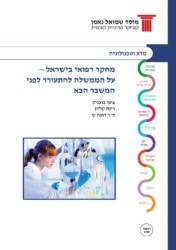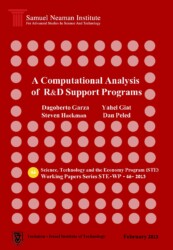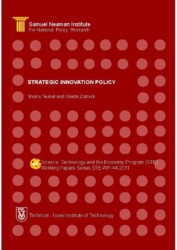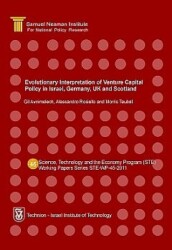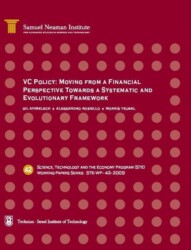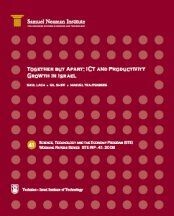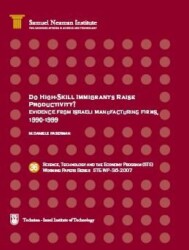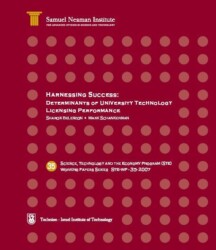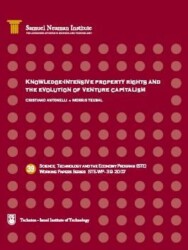STE is a core program of the S. Neaman Institute, aimed at developing national policy alternatives for key issues lying at the interface between Science, Technology and the Economy. Prof. Manuel Trajtenberg chairs and coordinates its activities, aided by Prof. Dan Peled and Prof. Saul Lach. There are about 15 researchers participating regularly in the program, mostly economists from various universities and research organizations, in addition to a range of other participants. During 2005, the program focused on a specific and timely topic, the Economics of Higher Education – Towards Redesigning the Israeli Model.
The program has been characterized since its inception by several outstanding features: First, it cuts across university boundaries trying to bring under one roof the best researchers in the field; second, it attempts not only to promote top academic research in STE-related areas, but also to harness the academic expertise so created for current policy issues; lastly, it aims to educate a cadre of young, policy-oriented research scholars for Israel. Hopefully this modus operandi will help place the S. Neaman Institute and the Technion at the center of national policy making. The activities of this program started in late October 2000, thus we are now in the midst of the program’s sixth year.
I. New Research Projects
The academic committee of the STE Program selected five projects and one continuation project, which bring in an excellent group of researchers from various universities and disciplines, and cover a range of topics of interest to the Program. We undertook to support fewer new projects, in view of the fact that in 2003-04 we supported an unusually large number of projects, quite a few of those are still ongoing, and the researchers conducting them participate in the meetings this year as well. Following is the list of projects:
1. “The role venture capital plays in the life sciences sector in Israel”
Morris Teubal and Yuval Markus, Department of Economics, Hebrew University
2. “Why do Foreign Firms Register Their Patents in Israel? An Empirical and Theoretical Study”
Benjamin Bental, Department of Economics, Michal Gal, Law School, Haifa University
3. “Start-up funding inefficiencies due to VC’s limited horizon.”
Eugene Kandel, Harry Yukleah, Business School, Hebrew University
4. “Incentives, Constraints and Objectives in Technology Licensing Offices and the Effectiveness of Technology Transfer Activities”
Mark Schankerman, LSE, UK, and Saul Lach, Department of Economics, Hebrew University
5. “The Longitudinal Panel of Israeli Manufacturing Firms: 1955-1999. Report for 2004, Plan for 2005″
Haim Regev, CBS
6. “Growth Profiles in the Israeli Enterprise Software Sector” (continuation project)
Jonathan Menuchin and Niron Hashai, Business School, Hebrew University
Several of the projects supported by the STE program in past years came to completion in the course of this academic year. The results were presented during the periodic meetings of the group, and published in the STE Working Papers series (see below).
II. Scholarships
Since its inception we understood at the STE Program that one of the limiting factors facing policy-oriented research in this field is the scarcity of economists and researchers in related disciplines that specialize in Science and Technology. It was thus decided to support graduate students in order to encourage them to write dissertations in this area. Since 2000-2001 we have supported some 20 students writing MA and Ph.D. dissertations at various universities, and this year we awarded scholarships to the following seven graduate students (notice the variety of institutions):
1. Edo Eshet, Law School, Tel Aviv University,
“Service Innovations”
2. Danny Breznitz, Ph.D. candidate, MIT
“A Misunderstood Miracle” – The State and the Growth of the IT Industry in Irelandâ€
3. Ity Shurtz, Eitan Berglas School of Economics, Tel Aviv University
“Estimation of Network Effects and Learning in the Diffusion of New Technology”
4. Shiri Breznitz, Cambridge University, UK
“The Role of the University in Regional Economic Development – The University as a social agent.”
5. Amit Epstein, Technion
“Location Choice of High-Tech Firms in Intra-Metropolitan Area”
6. Nir Brueller, Business School, Tel Aviv University,
“Creation and Capture of Value in Technology-Grafting Acquisitions”
7. Ofer Tur-Sinai, Law School, Hebrew University
“Patent Law and Sequential Innovations”
III. Working Papers
One of the intended goals of the STE Program is to influence the national agenda and policy making in Science and Technology. Thus, dissemination of the research outputs resulting from the projects supported is key to the success of the Program. One of the main vehicles to that end is the Working Papers Series, comprising the end results of STE projects, as well as other papers of related interest, written by researchers connected to the Program. These are the working papers published lately (several more are currently in the making):
- Menuchin, Jonathan, and Nir Hashsi, “Firm Growth Profiles (FGPs): Towards an Action-Based View of Firm Development.” STE-WP-24-2004 January 2005.
- Avimelech, Gil and Morris Teubal, “Evolutionary Innovation and High Tech Policy: What can we learn from Israel’s Targeting of Venture Capital?”. STE-WP-25, March 2005.
- Frenkel, Amnon, Daniel Shefer, Michal Miller, “Public vs. Private Technological Incubators Programs: Privatizing the Technological Incubators in Israel.” STE-WP-26, March 2005.
An additional research project, not under the auspices of STE but in its field of study, was entitled: “A Typology of New Business Formations Based on Psychological Contract Theory”, by Zipi Shperling and Michael Lubatkin.


